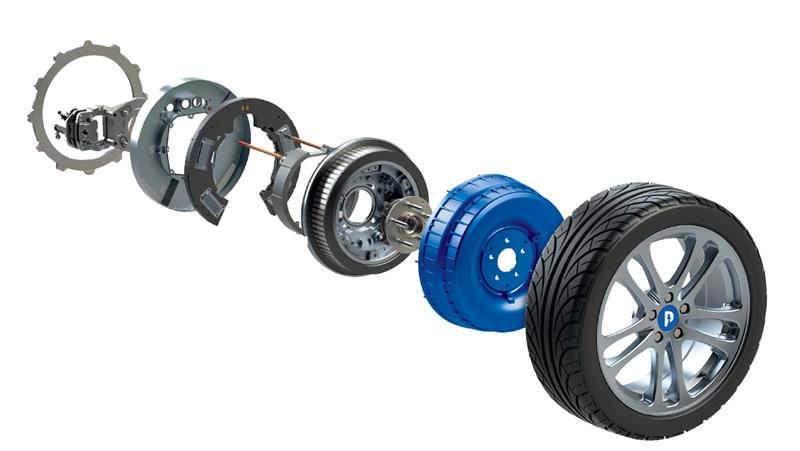For many, these opportunities have meant ‘thinking outside the box’ when it comes to design and abandoning many of the traditional design assumptions about what a car looks like and how it works.
A classic example of this can be seen in the work of Protean Electric, a UK company and automotive technology innovator, in its ProteanDrive in-wheel motors. Protean Electric is a world-leading developer of in-wheel motors including ProteanDrive, a fully integrated in-wheel drive solution.
Protean Electric’s technology is strategically positioned to play a major role in the hybrid, electric vehicle and future mobility market by offering a combination of packaging advantages, new vehicle design opportunities, performance benefits and earnings improvements. Globally, Protean Electric has 160 patents across 75 patent families with operations in the United Kingdom, China and the USA. It is a subsidiary of National Electric Vehicle Sweden (NEVS) and part of Evergrande Health’s ‘New Energy Vehicle’ Group.
In-wheel motors, also known as hub motors, give drivers improved torque response, enhanced handling, faster acceleration, less charging and greater range. Ready for volume application in passenger cars, light commercial vehicles, modern last-mile transportation solutions and autonomous mobility pods, Protean Electric’s in-wheel motors remove efficiency losses associated with gear, differential and CV joints situated around the vehicle. By moving power to the wheel, Protean Electric believes it has created a significant technological leap forward.
It says its ProteanDrive in-wheel technology offers high power and torque density. Designed to maximise efficiency and simplify the vehicle production process, all of the models are in-wheel motors with integrated power electronics and digital control, packaged with a compatible friction brake. Direct drive means no gears are required, and by partnering with leading brake system experts the company has developed friction brakes that suit any type of vehicle.
ProteanDrive also delivers functionality including torque vectoring and 90 degree turn radius, combined with a digital control platform that supports a range of AI and cloud- based services including autonomous EV sensors, digital ABS, vehicle diagnostics and road condition data.

Because ProteanDrive’s innovative in-wheel motor technology generates power directly in a vehicle’s wheels, this means greater range, reduced running costs and lower charge frequency.
Better handling is another benefit offered by the system, as individual wheel motors provide torque distribution to different wheels (torque vectoring). This means greatly Improved driver handling; enhanced stability and control; improved traction control; and shorter stopping distances.
Almost as important as these benefits, however, is the creative freedom that is afforded to designers by then use of in-wheel motors, which Protean Electric believes can revolutionise car design. This is because no requirement for existing driveline components means vehicle design can unlock opportunities for new services and revenue. This increase in the flexibility of vehicle design can also mean a more flexible manufacturing process and potentially simpler development of hybrids
Since in-wheel motors with integrated inverters do not require a gear, differential, drive-shafts or external drive electronics, there are also considerable production efficiencies to be achieved by their use. This means that systems costs could be comparable with traditional vehicles, while the costs for development and manufacturing can be reduced considerably. In addition, there are greater opportunities for modularity in the design and overall vehicle weights can be reduced.
Recently, Protean Electric has been selected to join the Wayra Intelligent Mobility (IM) Accelerator programme, which will give the business six months of development opportunities, including access to networks of like-minded partners, government agencies, customers and corporations.
Following a number of successful pitches to experts in the transport sector, Protean will join a cohort of technology companies on the programme, which launched on 3 July 2019.
The IM Accelerator programme is operated by Wayra UK – a Telefónica businessin partnership with the Connected Places Catapult. It supports selected disruptive companies with high-growth potential within the transport supply chain to scale up and tackle challenges such as congestion, overcrowding, emissions and road safety within the industry.
Wayra UK’s ‘best in class’ accelerator programme currently supports around 70 companies a year in locations across the United Kingdom, providing advice and mentorship to take ideas through to investment. Over the last seven years Wayra UK has invested and supported 180 companies and has helped to raise over $237 million in third party funding for companies currently valued at $835 million.
Protean will gain access to Wayra UK’s network of corporates, governments and other partners in the 17 countries in which Telefónica operates as well as opportunities to work with the Connected Places Catapult’s world leading data, visualisation, customer experience and connected and autonomous vehicle capability teams. In addition, Protean will benefit from the support of the programme’s industry partners: Ferrovial, Stagecoach Group and Hyundai.
Ben Boycott, chief commercial officer at Protean Electric, says: “As a world-leading developer of electric automotive technology, we are already experiencing great customer engagement with the benefits of in-wheel motors. The support from Wayra UK’s programme will help us to accelerate this success as we roll-out our innovative technologies.We look forward to working with the programme to extend our reach into wider networks and gain valuable insights and expertise.”
The programme accepts two cohorts of six companies a year and is the first in the UK to cover the full intelligent mobility market. Wayra UK aims to develop new UK-based industry leaders in the £1.4bn global transport systems market through data-driven solutions for the most crucial transport problems.











